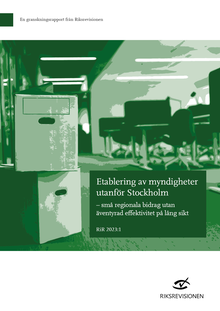Government agency relocations outside of Stockholm: minor but positive effects in the long term
Just over 4,000 “new” jobs and several million Swedish kronor less in costs for premises. These are some of the effects of the Government’s decision to relocate government agencies in locations other than Stockholm. Despite this, Stockholm’s proportion of the total number of central government employees is growing.

Photo: Jens Lindström
During 2004–2020, the Government made 62 decisions to place various central government agencies in locations other than Stockholm. On occasion, the Government has established new government agencies, but most frequently parts of existing government agencies have been relocated from Stockholm to other parts of the country.
The Swedish National Audit Office has audited whether this has had the expected positive effects, and whether it has led to persisting difficulties in areas such as staff supply.
The audit shows that it was possible to retain 6,000 existing jobs and 4,000 new jobs have been created in locations other than Stockholm. In other words, it is a matter of relatively few jobs in total, which in some parts of the country account for a minor but significant part of the regional labour market – mainly in Arvidsjaur, Östersund and Gotland.
These jobs have enhanced inhabitants’ options in the labour market and the prospect for academics to find a job within their field of specialisation without needing to take up residence in Stockholm. Overall, the jobs have to some degree improved the prospects of living and working in more parts of the country.
Earlier audits have highlighted that relocation results in major initial additional costs and a drop in productivity – sometimes over many years. However, this audit shows that, after a few years, the geographical placement does not lead to any significant problems for the government agencies in carrying out their core tasks or managing and coordinating their activities. In addition, costs of premises and staff have been lower compared with Stockholm. Staff turnover has also been lower than in comparable activities in the Stockholm region.
A condition for this has been that the government agencies have been located in regions with a sufficiently large labour supply, but sufficiently distant from metropolitan areas to attract employees who either live in the region or move there – rather than employees who commute from the metropolitan areas.
“In some cases, most of the employees have chosen to commute to work from other regions, in which case the agency’s placement has not contributed as much to regional development. The results are not perfect, but overall, the effects have been positive,” says Dorian Francis, Project Leader for the audit.
However, the Swedish National Audit Office notes that the concentration of central government jobs to the Stockholm region has increased somewhat during the audited period. The Government’s efforts have only slowed this development.
“If the Government wishes to achieve a more even distribution of central government jobs across the country, stronger measures are needed. At the same time, the long term benefit of relocations must be weighed against any negative consequences in the short term. Ultimately, it is a political matter,” says Auditor General Helena Lindberg.
Recommendations
If the Government wishes to continue to place new government agencies and to relocate existing agencies to locations other than Stockholm, the recommendations are to:
- continue to match government agencies that are the subject of establishment or relocation with regional labour markets that have a suitable supply of labour, to avoid problems for the government agencies’ operations in the long term
- avoid placing organisations that require specialist skills close to metropolitan regions, if the aim is to contribute to regional development.
Press contact: Olle Castelius, phone: +46 8-5171 40 04.
Presskontakt: Olle Castelius , telefon: 08-5171 42 06.
Share in social media and by e-mail
Contact form
Send your questions or comments via the form below and we will make sure that they reach the right member of staff. Please state if your question concerns the information on this particular page.


